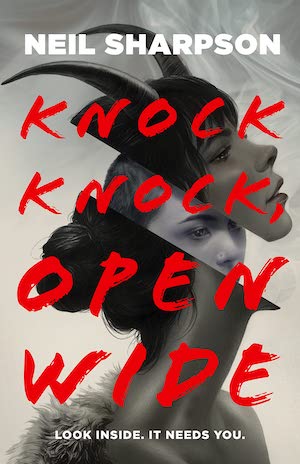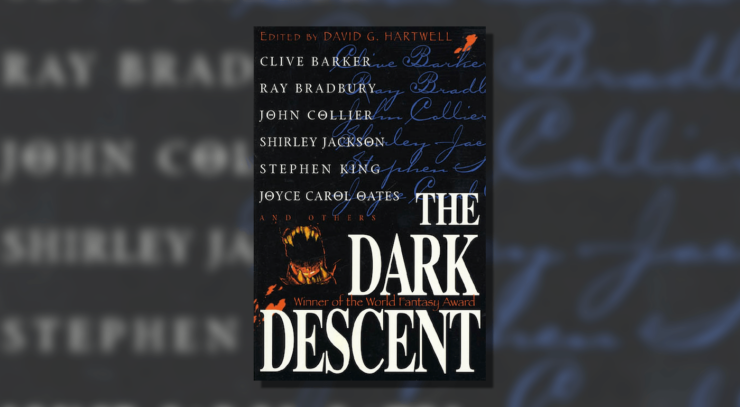Welcome back to Dissecting The Dark Descent, where we lovingly delve into the guts of David Hartwell’s seminal 1987 anthology story by story, and in the process, explore the underpinnings of a genre we all love. For an in-depth introduction, here’s the intro post.
“The Crowd” is more subdued than many of the works we’ve covered. While other stories in The Dark Descent’s “moral-allegorical” stream are scathing howls of indictment, acid-tongued satires, and literal sermons about society and morality, Ray Bradbury’s story of pack-hunting energy vampires is (as befits Bradbury, one of the best poets ever to work exclusively in prose) comparatively subtle. Bradbury presents a situation, sets up his protagonist Spallner, and then allows us to watch as Spallner is crushed not by a societal ill or personal failing, but merely a vain battle against a twisted natural order. By presenting these unnerving events as “natural,” with a monster that seems more at home in the world than our protagonist, Bradbury questions what kind of a world we’ve built, and what kind of natural order we accept if such terrors feel of a piece and can operate in our collective blind spot the way the crowd does. It’s an uneasy question, one that challenges us on our unwillingness to examine the realities of our own world.
A man named Spallner crashes his car while speeding in Los Angeles. Within seconds of the crash (the wheels haven’t even stopped spinning on the car), he is surrounded by a crowd of people who, despite their human appearance, radiate a “wrongness.” Playing and replaying the incident in the hospital, Spallner begins to research the unnerving crowd, only to find the same people appearing at various accidents over the course of fifty years. It’s clear he’s found something dangerous, possibly even life-threatening. But against such a supernatural force, what can he hope to do about it?
“The Crowd” functions as a kind of supernatural story of suspense, a vein in which Bradbury showed particular mastery. In these stories, the hero is suddenly made aware of some horrifying and esoteric supernatural phenomenon—it could be a vampire, a cabal of sorcerers acting in a small New England town, or even a crowd of onlookers circling around an accident victim…a crowd that just seems off. The hero sets out to investigate or push back against this wrong, collecting all the information and chasing all the leads they can in order to either expose this phenomenon or even better, put it down for good.
In the process, the creature or cabal becomes aware of their interference and goes on the attack, partly out of self-defense, and partly to avoid exposure. The protagonist’s attempts to understand and use the modern forces of authority are put to the test as they’re brought face-to-face with something they only thought they understood, and the story usually ends in tragedy. The terrors either adapt, are so sanity-shattering that the mere sight of them destroys any observer, or are simply too powerful, and any attempt to face them down is doomed to fail. They’re embodiments of deeper, older evils brought into a more modern context. The titular crowd in this story is like a force of nature, as well—they’re territorial hunters who travel in specific packs, only showing up for specific accidents.
This mode of horror, one that eschews explanation and works off the assumption that the evil has always been present is a much different kind of indictment than most “moral-allegorical” horror stories. If the crowd, this hive entity that feeds on the lifeforce of people in distress, adopts the form of a throng of people clustered around those dying from accidents and atrocities, what kind of environment would allow a monster to adapt in such a way? How did this thing, this pack that murders people via minimal interaction (by moving accident victims) learn to thrive in such an environment? Most horrifying, there’s not a sense that things are out of place or unnatural about the way “the crowd” operates. The eponymous crowd simply…exists. There’s no explanation, there’s no reason, there’s no greater system—it’s just a territorial hunter that kills and assimilates humans.
It’s also very much in line with Bradbury’s horror output. Bradbury’s horror stories are always about things that have always existed— the supernatural scavengers of “The Crowd,” the traveling carnival of Something Wicked This Way Comes, even to some extent the child monsters of stories like “Let’s Play Poison” all exude a sense of inertia, as if they embody the evils that existed long before the events of the stories and will continue to exist long after. In many of Bradbury’s horror-focused stories, the horrors are only superficially human. They act more like predators or things that see humanity as otherwise insignificant. There’s an idea of naturalistic order, that humanity is merely another link on a food chain that includes terrors alien to us but capable of using our systems and social conventions to blend in and prey on us.
Buy the Book


Knock Knock Open Wide
Fitting with this naturalistic horror, there’s nothing (outside of Spallner now noticing the crowd) that really changes—it’s specifically an intrusion into Spallner’s life, one that sends him spiraling into obsessive research and rants about the crowd’s behavior. The world continues at its natural and entirely horrifying pace around Spallner; his friends and medical professionals barely humor him as he tries to talk to them about the predatory crowds and his research, and everyone seems to regard the existence of these crowds as a minor oddity or nuisance, if they pay them any mind at all. Spallner notices the crowds, at the end the crowds finally notice him, and he finds himself swallowed according to the natural order of his world, as someone attempting to fight or disrupt the pattern. It’s not an imposed system like in “The Whimper of Whipped Dogs” or “Young Goodman Brown,” but somehow that makes it more terrifying, the suggestion that this is just The Way Things Are and anyone who attempts to change it or finds themselves slipping through those cracks subsequently meets an awful end.
In its own way, while it’s quieter than many of the existential offerings collected in Hartwell’s “moral-allegorical” category, “The Crowd” is also much more cynical. Bradbury’s use of more naturalistic monsters, and the idea that his protagonist simply fell through the cracks and woke up to the horrors of his world, make it even more terrifying when the crowd finally catches up to Spallner at last. Bradbury’s intent isn’t to indict the world or shine a light on the hypocrisies of which we all partake, it’s to ask a simple question, one asked again and again by the best of moral and social fiction: “Why?” Why would anyone choose to live like this? Why do we pretend everything’s normal and fine even when we’re aware there’s an inherent wrongness to our world? Why would such horrors feel right at home in our world?
It’s not really a question anyone can answer, but it’s still one worth considering.
And now to turn it over to you. What’s your favorite “naturalistic” horror story like “The Crowd”? What’s the best example of a monster whose only motive is maintaining its natural order?
Also, as I’m a huge Bradbury fan, I’d like to hear from you: What’s your favorite sentence or paragraph from his writing? (I’m a sucker for the last sentence of “The October Game” and the opening lines of Something Wicked This Way Comes, myself)
Join us in two weeks as we, well, dissect a dissection with “The Autopsy” by Michael Shea.
Sam Reader is a literary critic and book reviewer currently haunting the northeast United States. Apart from here at Tor.com, their writing can be found archived at The Barnes and Noble Science Fiction and Fantasy Book Blog and Tor Nightfire, and live at Ginger Nuts of Horror, GamerJournalist, and their personal site, strangelibrary.com. In their spare time, they drink way too much coffee, hoard secondhand books, and try not to upset people too much.










